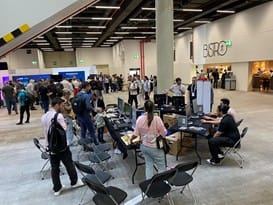On 4th of July, The Data School - including myself, was represented at the ITCS in Hamburg to inspire people about data. Before I share my experience and impressions, let me briefly introduce what the ITCS is all about.
The ITCS is a tech conference where over 100 companies – ranging from innovative start-ups to global tech corporations – come together to connect with people and share insights into the latest IT trends. It brings togehter networking and expert talks in a relaxed and engaged setting. Multiple stages features speakers presenting the latest developement in IT. In addition, numerous job offers and career opportunities make the event espacially interesting for young professionals. The ITCS provided exciting insights into current IT topics – from cybersecurity to social debates around AI. I was particulary fascinated by the AI stage, where innovative uses cases and the potential of AI were showcased.
Ok, let’s move on to my impressions and experiences from the ITCS. As I mentioned above, there were over 100 companies present – ranging from data-driven firms to those in electrical engineering – including names like KPMG, Dräger, and Hamburger Energienetze. The atmosphere was engaging, and people were highly motivated and curious about what’s happening in the world of IT and tech.

On top of that – and in my personal opinion – the stages really made the difference. Many interesting topics were covered by a wide range of companies across several stages.
There was the AI Stage, where practical applications and opportunities of AI were presented. The Tech Talk Stage focused on technology topics, including those related to human resources. And the Women in Tech Stage featured inspiring talks by women, not only about being a woman in tech, but also about broader topics like cybersecurity and the future of technology – all presented by women.
Apart from the talks, the event also offered a small bistro area with snacks. And what’s more? A retro gaming area! Yes – for nerds like me, this was a real highlight.

After what felt like decades, I was suddenly transported back to my childhood: three years old, playing on an Amiga Commodore 64, gripping that iconic joystick – just like in the picture below:

Now that you hopefully have an impression, I’d like to briefly introduce the talks I curiously attended. Here are some of the talks I attended:
FIFF e.V – Künstliche Intelligenz zwischen hochgeschraubten Erwartungen und abgründigen Befürchtungen by Prof. Dr. Hans-Jörg Kreowski
To summarize the talk briefly: The expectations placed on artificial intelligence – both from politics and business – are high. There have indeed been spectacular advances, particularly in areas like language and image processing. However, despite these impressive achievements, the speaker does not believe that today's AI systems will ever develop into truly self-thinking beings. The concept of "thinking" itself is still not fully understood.
Moreover, current AI models rely heavily on data – vast amounts of it – which are statistically analyzed. These datasets must be carefully cleaned, as flawed data will inevitably produce flawed results. And yet, despite these very rational limitations, even leading AI experts speculate that artificial intelligence could one day pose an existential threat to humanity. The speaker questioned this idea, asking: why would an AI even come up with the intention to destroy humanity in the first place?
Beyond the potential benefits of AI, the talk also addressed its darker sides. AI can, of course, be used for criminal or political purposes – including invasions of privacy, fake news, or social scoring systems.
DCSO GmbH – More than Code: Why Cybersecurity needs a Geopolitical Outlook by Kritika Roy, Senior Threat Intelligence Researcher
The author explores the question of why geopolitics matters in the context of cybersecurity. State-linked actors never act in isolation. Geopolitics plays a crucial role because it provides the necessary context to understand potential targets — such as critical energy infrastructure.
It also helps explain the intensity and frequency of cyberattacks, enabling smarter threat modeling and more effective risk prioritization. But it’s not just about context — different perspectives are needed. Each one is like a piece of a puzzle that contributes to a more complete picture.
The author illustrates this idea with the analogy of the elephant and the blind men: one feels a rope, another a wall, another a pipe — but without seeing the whole, the true form remains hidden. Many variables are at play. While cybersecurity is still about code and technology, geopolitics has become a major pivot point in understanding and anticipating threats.
In conclusion, attending the ITCS was an inspiring and enriching experience. It was great to see how diverse, dynamic, and collaborative the world of tech can be – from ethical debates to playful moments in the gaming area. I'm already looking forward to next year!
